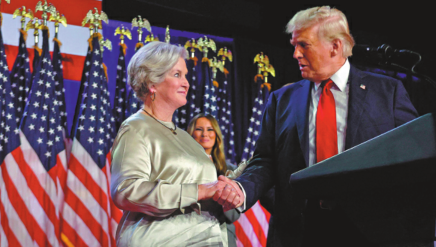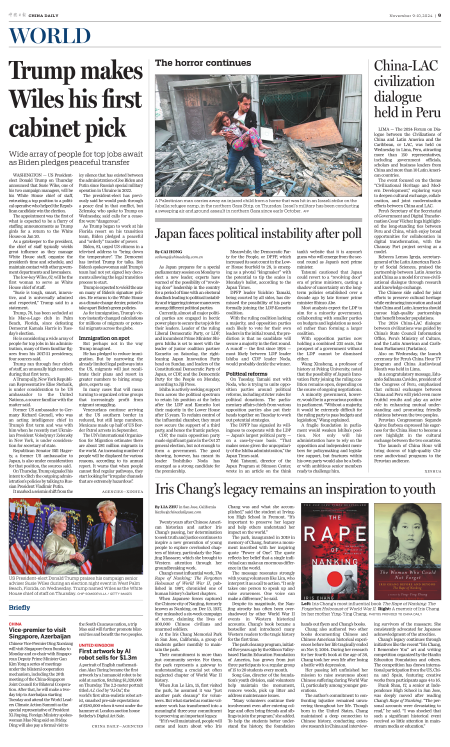
US President-elect Donald Trump praises his campaign senior adviser Susie Wiles during an election night event in West Palm Beach, Florida, on Wednesday. Trump named Wiles as the White House chief of staff on Thursday.
WASHINGTON — US President-elect Donald Trump on Thursday announced that Susie Wiles, one of his two campaign managers, will be his White House chief of staff, entrusting a top position to a political operative who helped the Republican candidate win the election.
The appointment was the first of what is expected to be a flurry of staffing announcements as Trump girds for a return to the White House on Jan 20.
As a gatekeeper to the president, the chief of staff typically wields great influence as they manage White House staff, organize the president's time and schedule, and maintain contact with other government departments and lawmakers.
The low-key Wiles, 67, will be the first woman to serve as White House chief of staff.
"Susie is tough, smart, innovative, and is universally admired and respected," Trump said in a statement.
Trump, 78, has been secluded at his Mar-a-Lago club in Palm Beach, Florida, since defeating Democrat Kamala Harris in Tuesday's election.
He is considering a wide array of people for top jobs in his administration, many of them familiar figures from his 2017-21 presidency, four sources said.
Trump ran through four chiefs of staff, an unusually high number, during that first term.
A Trump ally, New York Republican Representative Elise Stefanik, is under consideration to be US ambassador to the United Nations, a source familiar with the matter said.
Former US ambassador to Germany Richard Grenell, who was an acting intelligence chief in Trump's first term and was with him when he recently met Ukrainian President Volodymyr Zelensky in New York, is under consideration for secretary of state.
Republican Senator Bill Hagerty, a former US ambassador to Japan, is also under consideration for that position, the sources said.
On Thursday, Trump signaled his intent to ditch the outgoing administration's policies by talking to Russian President Vladimir Putin.
It marked a seismic shift from the icy silence that has existed between the administration of Joe Biden and Putin since Russia's special military operation in Ukraine in 2022.
The president-elect has previously said he would push through a peace deal in that conflict, but Zelensky, who spoke to Trump on Wednesday, said calls for a ceasefire were "dangerous".
As Trump began to work at his Florida resort on his transition team, Biden pledged a peaceful and "orderly" transfer of power.
Biden, 81, urged US citizens in a televised address to "bring down the temperature". The Democrat has invited Trump for talks. But Biden's spokeswoman said Trump's team had not yet signed key documents allowing the legal transition process to start.
Trump is expected to wield the axe on many of Biden's signature policies. He returns to the White House as a climate change denier, poised to take apart Biden's green policies.
As for immigration, Trump's victory instantly changed calculations for millions of migrants or potential migrants across the globe.
Immigration on spot
But perhaps not in the way Trump imagined.
He has pledged to reduce immigration. But by narrowing the already limited legal pathways into the US, migrants will just recalibrate their plans and resort in greater numbers to hiring smugglers, experts say.
In many cases that will mean turning to organized crime groups that increasingly profit from migrant smuggling.
Venezuelans continue arriving at the US southern border in reduced, but still large numbers. Mexicans made up half of US Border Patrol arrests in September.
The UN's International Organization for Migration estimates there are about 281 million migrants in the world. An increasing number of people will be displaced for various reasons, according to its annual report. It warns that when people cannot find regular pathways, they start looking for "irregular channels that are extremely hazardous".

